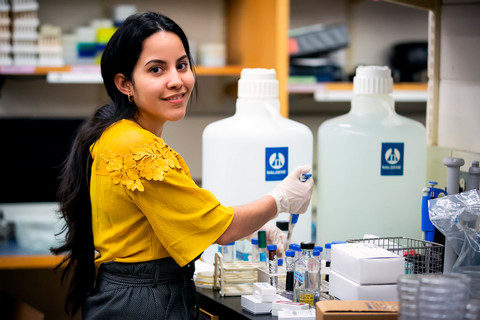Yassel Hernandez Sets Her Own Path in the Biotechnology Program

Photo Credit: Simon Goodacre
March 12, 2021
Cynthia Kipkorir | Graduate School of Arts and Sciences
Yassel Hernandez was investigating various masters biotechnology programs located in her home state of New Jersey when a friend suggested that she look into Brandeis. Though Hernandez was initially hesitant to move to another state, the university’s reputation and proximity to biotech companies in the Boston area made it an extremely attractive choice. She adds: “Brandeis University is a school with a lot of history, and the faculty is very well known for their contribution in various fields of science.” However, when Hernandez was offered a DEIS Scholarship, her decision to pursue a masters in biotechnology at Brandeis became a no-brainer: “I did not think twice about it and immediately took the opportunity.”
Before being interrupted by the COVID-19 global pandemic, Hernandez worked in Professor Sacha Nelson’s lab which looks at gene expression and electrophysiology in the mammalian nervous system. Her work in the lab has expanded her knowledge of the field and increased her awareness of the current gaps in understanding the mammalian nervous system. Additionally, her lab experience has taught her about herself. Instead of pursuing internships like many masters students in biotechnology, Hernandez took advantage of her program’s flexibility which allowed her to recognize her own path. She states: “I decided to work in a lab rather than obtaining an internship because I'm more interested in obtaining experience in a research lab.” She credits the lab with making her experience at Brandeis “incredible...because I have mentors and people around me who have been in the research field for years.”
Thus far, Hernandez enjoys her experience in the Biotechnology program. This is due in large part to the program’s faculty, whom Hernandez applauds for their reliability and willingness to provide advice to their students: “I feel that in this program, the faculty are always available and open for any questions. They relate to the struggles that graduate students go through on a daily basis.” Because of this involvement and mentorship, Hernandez insists that “the transition from undergrad to graduate school has been easier because of the faculty in the program.”
Though Hernandez is still deliberating about what to do with her masters degree after graduation, she is sure about one thing: it will not be the end of her education. “I feel there is no stopping point when it comes to education, and since science never rests, it makes me want to keep going.” For students interested in the Biotechnology program at Brandeis, Hernandez is adamant that they follow through and apply, stating: “The work demand in this field is increasing every day. Acquiring a master's in biotechnology at Brandeis would give students the tools and knowledge to work in a biotechnology company.”






